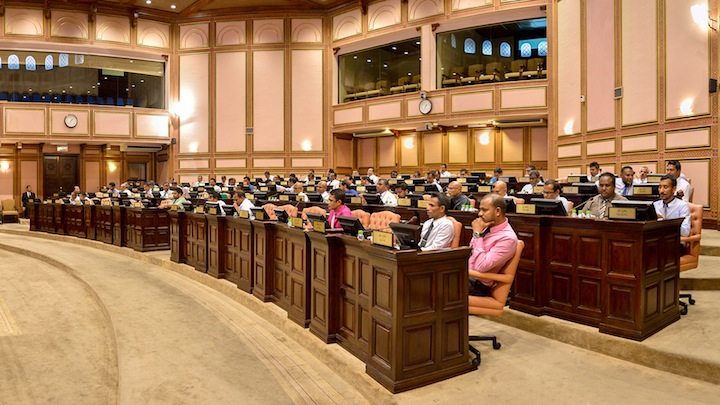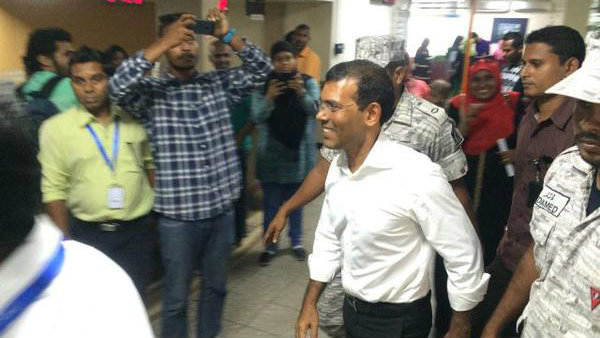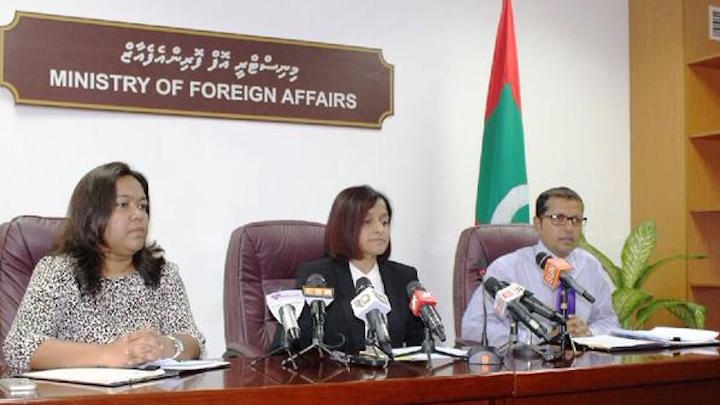Case number: 2014/SC-SM/42
Defendant: Human Rights Commission of the Maldives
Type: Suomoto
Date trial began: 16 September 2014
Date trial ended: 16 June 2015
Bench: Chief Justice Abdulla Saeed, Abdulla Areef, Ali Hameed Mohamed, Adam Mohamed Abdulla, Dr Ahmed Abdulla Didi
Case summary:
The Human Rights Commission of the Maldives, in the Universal Periodic Review Report, April- May 2014 (session 22), under the subheading access to justice (page 4), unlawfully spread false information about the Supreme Court’s jurisdiction, the constitutional and legal procedures followed by the courts of the Maldivian judiciary in conducting trials and ensuring justice, and the procedures followed by the courts in releasing information. The commission has circulated this report in the Maldives and abroad. In the report, the commission described the Supreme Court’s mandate – acting in its role as the highest authority for the administration of justice in the Maldives and as per international best practices and the Maldivian Constitution—as controlling the courts of the Maldives. In doing so, the commission has deliberately attempted to undermine the independence of one of the three branches of the Maldivian state, i.e. the independent judiciary. The commission has also damaged the Maldives’ independence and sovereignty, and deliberately attempted to undermine the Constitution of the Maldives. This case was initiated by the Supreme Court to hold accountable the members of the Human Rights Commission of the Maldives in a court of law, under powers vested in the Supreme Court as the highest administrator of justice in the Maldives, under Article 141 (b) of the Constitution, Article 9 (f) of the Judicature Act (Law no: 22/2010), and Article 86 of the Supreme Court regulations. The defendant in this case is the Human Rights Commission of the Maldives.
Points of note:
The Supreme Court –with reference to the facts, documents, evidence, testimony provided by the members of the Human Rights Commission of the Maldives in court, the Constitution, the Judicature Act, other relevant laws, and norms accepted in democratic societies – notes the following:
a) First, the most fundamental principle of international law is the principle of non-intervention in the sovereignty and the domestic affairs of another state. This is also the foremost pillar of the Maldivian democratic system. The Maldives has the right, based on the principle of sovereign equality and sovereign immunity, to participate in the international community as an equal to other states. It is unlawful for any party or individual to commit acts against national security and interests, as per the Constitution of the Maldives. Further, similar to other states, it is only the executive function (Sultha – Siyasiyya) that can represent the Maldivian state. According to international law, the Maldivian state is mandated to fulfill the three conditions of statehood i.e. territory, the citizens and the executive function. There is no legal dispute over the fact that the executive function has the sovereign power to conduct its own affairs in accordance with constitutional principles designated by the state within the state’s sovereign jurisdiction. Further, Article 2 of the Constitution states that the Maldives is a sovereign, independent, democratic republic based on the principles of Islam, and is a unitary state. The three branches of the executive function are the legislative branch, the executive branch and the judicial branch. The powers of these three branches are clearly defined in Article 5,6 and 7 of the Constitution.
b) Second, given Article 115 (j) (k) of the Constitution states that it is the president who is authorized to determine, conduct and oversee the foreign policy of the country, to conduct political relations with foreign nations and international organizations, to enter into general treaties and agreements with foreign states and international organizations, which do not impose any obligations on citizens, and to enter into and ratify, with the approval of the People’s Majlis, treaties and agreements with foreign states and international organizations, which impose obligations on citizens,
and given that the legal procedures of the sovereign and legal system and international procedures state that acts such as dissemination of information and reports in the name of the state to foreign bodies, to meet international obligations, must be organized within the state,
It is clear that any act committed by any party or institution that contravenes these procedures is unlawful and violates the principle of supremacy of the Constitution laid out in Article 299 of the Constitution and the principle of rule of law.
c) Third, in the preamble to the Universal Declaration of Human Rights (UDHR), it is stated that human rights should be protected by the rule of law. Article 8 and 10 of the UDHR state that everyone has the right to an effective remedy by courts or national tribunals for acts violating the fundamental rights granted to them by the constitution or by law, and that everyone is entitled in full equality to a fair and public hearing by an independent and impartial tribunal, in the determination of his rights and obligations and of any criminal charges against them. Hence, it is known that the final authority to apply legal principles lies with the courts.
With reference to the principle of the rule of law, and to Article 42 (a) of the Constitution of the Maldives that states that everyone is entitled to a fair and public hearing within a reasonable time by an independent court or tribunal established by law to determine one’s civil rights and obligations or of any criminal charge, and with reference to the abovementioned clauses of the UDHR, and with reference to the supervisory role granted to the Supreme Court – in order to uphold the responsibility of protecting individual and communal rights and to strengthen and improve access to justice – by Article 141 (b) of the Maldives Constitution,
and while Article 143 (b) and (d), and Article 144 and Article 145, grant the Maldives Supreme Court, similar to the apex courts in other democratic societies, the power, in its supervisory authority to ensure basic rights, to issue habeas corpus, mandamus, certiorari, writ of prohibition, and quo warranto prerogative writs, and while the procedures to issue such rulings have been decided by the Maldives’ legal system and by the Supreme Court’s rulings,
the Human Rights Commission of the Maldives has prepared a report that provides false information about these legal procedures, without referring to official sources such as the Constitution, laws and regulations, and court rulings.
It is clear this information is baseless from the confession of the members of the Human Rights Commission in court. Even though members in court said they had provided information in such a manner because the Supreme Court had not responded to requests for information on these procedures, they were unable to prove to any extent that they had made a request for such information. While laws and regulations concerning the courts, and court rulings are made available to the public, there is no law that allows the Human Rights Commission of the Maldives to write a report containing false information regarding these provisions.
This act by the Human Rights Commission of the Maldives contravenes Article 189 of the Constitution that states that the commission must be an independent and impartial commission that shall promote respect for human rights, impartially without favor and prejudice. It also contravenes the Human Rights Commission Act (Law no: 6/2006) that states the commission must promote human rights in line with the Constitution of the Maldives.
d) Fourth, the preparation of the above-mentioned report was unlawful as it contained information that is false, and information that misleads [the public] about the jurisdiction of the courts. Hence, the preparation and the dissemination of the report by the Human Rights Commission amounts to interference with the judiciary’ work and undue influence of the judiciary. It also contravenes Article 141 (c) and (d) of the Constitution and international norms, and clearly violates the independence granted to the judiciary by international laws. It is known from the commission members’ testimony in court that the information included in the Human Rights Commission of the Maldives’ report is false and based on unreliable sources. It is clearly known from the Constitution, laws and regulations regarding judicial procedures, and from court verdicts, that the Maldivian courts conduct trials, as in other democratic societies, according to legal procedures which are written to ensure fair trial. The Maldivians state is one that maintains respect for obligations under international covenants that it is party to, and on its own initiative, passes laws to protect human rights in line with international standards, and the Maldivian state abides by these laws. The Maldivian state has established the Human Rights Commission of the Maldives as a national body according to the Paris Principles. Given that the three branches of the Maldivian state protect and promote human rights, the members of the Human Rights Commission of the Maldives, have shown bias, undermined the commission’s credibility, been willfully negligent towards the progress the state has made and continues to make in [establishing] democracy and upholding the rule of law and human rights, and has been oblivious to those who commit terrorist acts against the people, state institutions and security forces, and acts that endanger peace and order, and undermine the state’s independence and sovereignty, and those who commit such acts. It is clear that the commission, by failing to rely on credible information and by preparing a false report and by disseminating this report, has acted unlawfully and encouraged acts that undermine the Maldives’ independence, sovereignty, constitutional system, and peace and order.
e) Fifth, state institutions must function according to societal truths and values, and with regard to the state’s capabilities and facilities that are available to it, and without spreading unlawful information that endangers the state, and without allowing room for unlawful acts, and by prioritizing prudent and peaceful solutions, and based on principles that bring out the best results. Although there are rights afforded to individuals, one of the most fundamental responsibilities of the national body on human rights (The Human Rights Commission of the Maldives) is to refrain from acts that undermine the nation and public interest. It is clear that the national body on human rights must function impartially and as a national institution according to the UN resolution passed in the 1993 Vienna Conference and according to the Paris Principles. The role of the national body on human rights, established within the state’s sovereign system, must be to promote human rights and to advise the government and other authorities on protecting human rights, and conducting awareness programs. Hence, such a national body must not overstep into the jurisdiction of any institution within the executive power or that of the security forces or the judiciary or the legislature. It is not legal to make a law in such a manner or interpret a law in such a manner. The Human Rights Commission of the Maldives is a body that listens to complaints by the citizens, and works to address such complaints, and interacts directly with the people. It is clear that for such an institution to act in ways that overlap with the mandate of other state institutions, in fact, undermines its own mandate.
f) Sixth, the national body on human rights must work within the sovereign legal system of the state, in the spirit of cooperation with the branches of the state and its institutions, without bias, to provide recommendations on matters concerning human rights and matters violating human rights, to review complaints of violations of human rights and to provide redress, to advise on bills protecting human rights and revisions for such laws, to assess the situation of human rights, to provide advice in such situations, and to conduct educational and awareness programs on human rights, or conduct such programs in association with other state offices, in order to promote and protect human rights.
Verdict
Whereas the Article 141 (b) of the Maldives Constitution clearly states that the highest authority for the administration of justice is the Maldives Supreme Court,
Whereas [the Human Rights Commission of the Maldives] has described steps taken by the Supreme Court, in its role as the guardian of the Maldives Constitution and laws, to uphold the independence and impartiality of the judiciary, and to ensure justice without fear and prejudice, and according to the Islamic Shariah and laws, and to uphold the rule of law, as controlling the judiciary,
Whereas the Human Rights Commission of the Maldives, in the subheading access to Justice in the report, the Universal Periodic Review (UPR), which was made public on September 16, 2014, has mislead [the public] on the jurisdiction of the highest authority in the administration of justice, the Supreme Court, and on the legal procedures used by the courts in conducting trials, and on the procedures used by courts in providing information
Whereas the Human Rights Commission of the Maldives has prepared the abovementioned report, shared this report with parties in the Maldives and abroad, and whereas this report contains false information regarding the procedures accepted and followed by the courts,
Given that Article 145 (c) of the Maldives Constitution states that the Supreme Court shall be the final authority on the interpretation of the Constitution, the law, or any other matter dealt with by a court of law, and
Given Article 20 of the Maldives Judicature Act (22/2010) clearly states that the government, the parliament and the state institutions must obey and abide by the Supreme Court’s rulings
It is ruled that the statement made by the Human Rights Commission of the Maldives which describes the previous, current and future work of the Supreme Court, acting in its role as the highest authority in the administration of justice, and according to the Maldives Constitution, relevant laws and international best practices, as controlling the judiciary, and disseminating information that is false and undermines trust in the judiciary via the above mentioned report to parties in the Maldives and abroad, is an act that contravenes Article 141, Article 145 (c), Article 299 (a) of the Maldives Constitution, and Article 20 (a) and (b) of Law no 22/2010 (Judicature Act)
Hence, the Human Rights Commission of the Maldives is ordered to respect the Maldives Constitution and not to repeat such an act deliberately.
Further, given that the Human Rights Commission of the Maldives, established under Article 189 (a) of the Maldives Constitution, similar to other state institutions, has no obligations other than those mandated by the Islamic Sharia, the Maldives Constitution and laws, international covenants the Maldives is party to, and part of the international covenants the Maldives is party to,
And given that the Maldives is a sovereign, independent, democratic republic based on the principles of Islam, and is a unitary state,
The Human Rights Commission of the Maldives, in conducting activities to promote and protect human rights, is ordered to:
- Act within the ambit of the Maldives Constitution and laws to ensure the full protection of the interests of Maldivian state and its citizens
- Ensure the commission does not in any manner disrupt the Maldivian citizen’s unity and homogeny
- Ensure the commission does not undermine peace, security, order, and age-old norms of behavior
- Ensure the commission does not overlap with and take over the responsibilities and mandate of other state institutions
- Ensure such activities are permitted in Maldivian society by the Maldives Constitution and its laws
- Ensure such activities are in line with the Maldivian faith, accepted societal norms, and good behavior
- Ensure such activities are based on policies compiled in light of credible research in line with the Maldivian faith, accepted societal norms, good behavior, the Maldivian Constitution and laws, and in a manner that protects national security, peace and unity, and with the full cooperation of other institutions of the Maldivian state
- In the event the commission has to work with foreign bodies, the commission, as an organ of the sovereign and independent Maldivian state, must follow procedures established by the state and work with the mediation of the relevant state institution
- Uphold the lawful government, ensure respect for the rule of law, and ensure such activities increase the citizens’ obedience to the rule of law
- Ensure such activities are free from political bias, and without the intention of furthering the interests of a specific party or to defame a specific party
- Ensure such activities do not encourage political, social and religious extremism, and do not facilitate hardship for the Maldives, and do not tarnish the Maldivian nation’s good reputation.
Likes (2)Dislikes
(2)Dislikes (0)
(0) 


